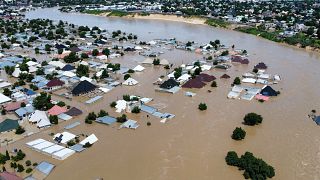Floods
On Tuesday, September 10, the collapse of the Alau Dam in northern Nigeria intensified the ongoing flooding across West and Central Africa. T
The dam, located 20 kilometers from Maiduguri, Borno State’s capital, failed after weeks of heavy rain, submerging parts of the city and destroying thousands of homes in an area with nearly one million residents.
The collapse has caused 30 deaths and displaced around 400,000 people, adding to the severe impact of the floods in Nigeria. As of September 6, the UN had already reported over 200 deaths and 225,000 displacements. Borno State remains one of the most affected regions.
The floods have also destroyed schools, health centers, and businesses, bringing economic activity in Maiduguri to a halt. The situation has worsened the existing humanitarian crisis in a region already suffering from the Boko Haram insurgency.
With rains continuing and 50,000 people still in displaced persons camps in Maiduguri, aid efforts are being hindered by insecurity in the area, making the situation even more challenging.











01:11
Mourning begins in Texas as over 170 remain missing from flash floods
00:56
South Africa: At least 101 dead in Eastern Cape floods as rescue efforts continue
01:36
CO2 emissions on track to push Earth beyond 1.5 degree threshold by 2028, report finds.
00:41
Devastating floods in Eastern Cape Leave 78 dead as rescue efforts continue
Go to video
South Sudan: UN warns of imminent famine
01:13
Deadly Floods Devastate South Africa’s Eastern Cape: At Least 49 Dead, More Missing